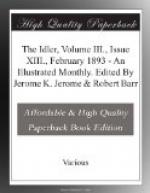“Nonsense, nonsense,” said Tom, though his expression belied his words. “At the worst I should think he couldn’t find his way home, and couldn’t get a cab, so put up for the night at some hotel. I daresay it will be all right.” He began to whistle as if in restored cheerfulness. At eight o’clock there came a letter for Roxdal, marked “immediate,” but as he did not turn up for breakfast, Tom went round personally to the City and Suburban Bank. He waited half-an-hour there, but the manager did not make his appearance. Then he left the letter with the cashier and went away with anxious countenance.
That afternoon it was all over London that the manager of the City and Suburban had disappeared, and that many thousand pounds of gold and notes had disappeared with him.
[Illustration: “Scotland yard opened the letter.”]
Scotland Yard opened the letter marked “immediate,” and noted that there had been a delay in its delivery, for the address had been obscure, and an official alteration had been made. It was written in a feminine hand and said: “On second thoughts I cannot accompany you. Do not try to see me again. Forget me. I shall never forget you.”
There was no signature.
Clara Newell, distracted, disclaimed all knowledge of this letter. Polly deposed that the fugitive had proposed flight to her, and the routes to Africa and South America were especially watched. Some months passed without result. Tom Peters went about overwhelmed with grief and astonishment. The police took possession of all the missing man’s effects. Gradually the hue and cry dwindled, died.
CHAPTER V.
Faith and unfaith.
“At last we meet!” cried Tom Peters, while his face lit up in joy. “How are you, dear Miss Newell?” Clara greeted him coldly. Her face had an abiding pallor now. Her lover’s flight and shame had prostrated her for weeks. Her soul was the arena of contending instincts. Alone of all the world she still believed in Everard’s innocence, felt that there was something more than met the eye, divined some devilish mystery behind it all. And yet that damning letter from the anonymous lady shook her sadly. Then, too, there was the deposition of Polly. When she heard Peters’s voice accosting her all her old repugnance resurged. It flashed upon her that this man—Roxdal’s boon companion—must know far more than he had told to the police. She remembered how Everard had spoken of him, with what affection and confidence! Was it likely he was utterly ignorant of Everard’s movements? Mastering her repugnance, she held out her hand. It might be well to keep in touch with him; he was possibly the clue to the mystery. She noticed he was dressed a shade more trimly, and was smoking a meerschaum. He walked along at her side, making no offer to put his pipe out.




